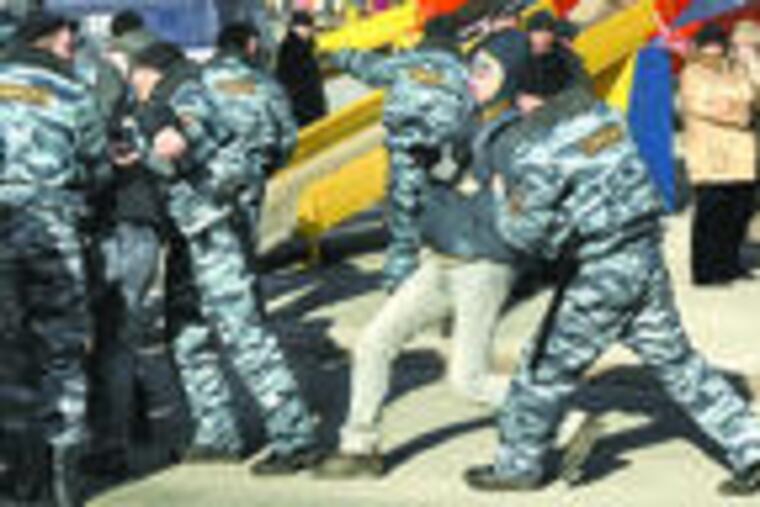Protest over Russia's car tariffs intensifies
VLADIVOSTOK, Russia - Riot police clubbed, kicked and detained dozens in the Pacific port of Vladivostok yesterday in a harsh crackdown on a protest that was one of dozens across Russia by people outraged over an increase in car import tariffs.

VLADIVOSTOK, Russia - Riot police clubbed, kicked and detained dozens in the Pacific port of Vladivostok yesterday in a harsh crackdown on a protest that was one of dozens across Russia by people outraged over an increase in car import tariffs.
With unemployment spiking, prices rising and the ruble sliding, the protests over a seemingly mundane tariff appear to be broadening into a wide expression of public discontent - and beginning to present a genuine challenge to the Kremlin.
"The Russian people have started to open their eyes to what's happening in this country," said Andrei Ivanov, 30, a manager who joined about 200 people at a rally in Moscow. "The current regime is not acting on behalf of the welfare of the people, but against the welfare of the people."
The government announced the tariffs on imported automobiles this month to bolster flagging domestic car production and try to head off layoffs or labor unrest among the country's more than 1.5 million auto-industry workers.
But imported used cars are highly popular among Russians, particularly throughout the Far East, where private cars imported from nearby Japan vastly outnumber vehicles built in Russia. Protests against the tariffs, which are scheduled to go into effect next month, have been most vehement in Vladivostok, Russia's largest Pacific port.
Second weekend
Hundreds rallied in the city Saturday for the second weekend in a row, and demonstrators hoped to rally again yesterday. But authorities refused to authorize the demonstration, and hundreds of riot police blocked off the city square where it was planned.
Soon after, several hundred people gathered on Vladivostok's main square - not the planned site of the demonstration. Waiting riot police ordered them to disperse, saying the gathering was illegal. The group refused and began singing and dancing around a traditional Russian New Year's tree on the square.
Police - some shipped in from Moscow, 5,750 miles to the west - began hauling men and women into waiting vans as people chanted "Fascists!" and "Shame! Shame!"
A reporter saw police beat several people with truncheons, throw them to the ground, and kick them. Several parents were detained as their children watched.
"Riot police encircled the group . . . even those just passing by, and they started taking people away without any sort of comment," said Olga Nikolaevna, 62, a retiree who witnessed the incident.
A reporter saw at least 10 journalists detained by police, who demanded that several journalists turn over videotapes and photo memory chips. Police wrecked a Japanese TV crew's video camera, and some journalists were beaten and kicked.
Police criticized
Vladimir Litvinov, who heads a local rights group, said police behaved "like beasts" and had no right to break up the gathering, since it wasn't overtly political.
"We support a civilized resolution to all the problems but when they send Moscow riot police to break up a gathering in our city, and they start breaking arms and legs and heads . . . ," he told the Associated Press. "People are very, very angry. It's hard to predict what might happen now."
Regional police officials said they were forbidden from saying how many people had been arrested. Protest organizers and witnesses counted more than 100.
Protests over the car tariffs were held in more than a dozen cities, with motorists driving in long columns with flags waving. National TV channels, which are state-controlled, ignored the demonstrations.
In Moscow, about 200 protesters wore yellow ribbons on their jackets and held placards decrying the tariffs, the government and the rise in consumer prices.
"At the same time, we're registering general discontent with the policies of this government," said Yulia Marova, 28, a Moscow resident.
The Kremlin has sidelined political opponents and put tight controls on civil society and the media, rolling back many post-Soviet freedoms.
But in recent weeks, migrant workers in the Ural Mountains city of Yekaterinburg protested wage arrears and pensioners in the Siberian town of Barnaul took to the streets to protest the withdrawal of discounted fares on public transport.